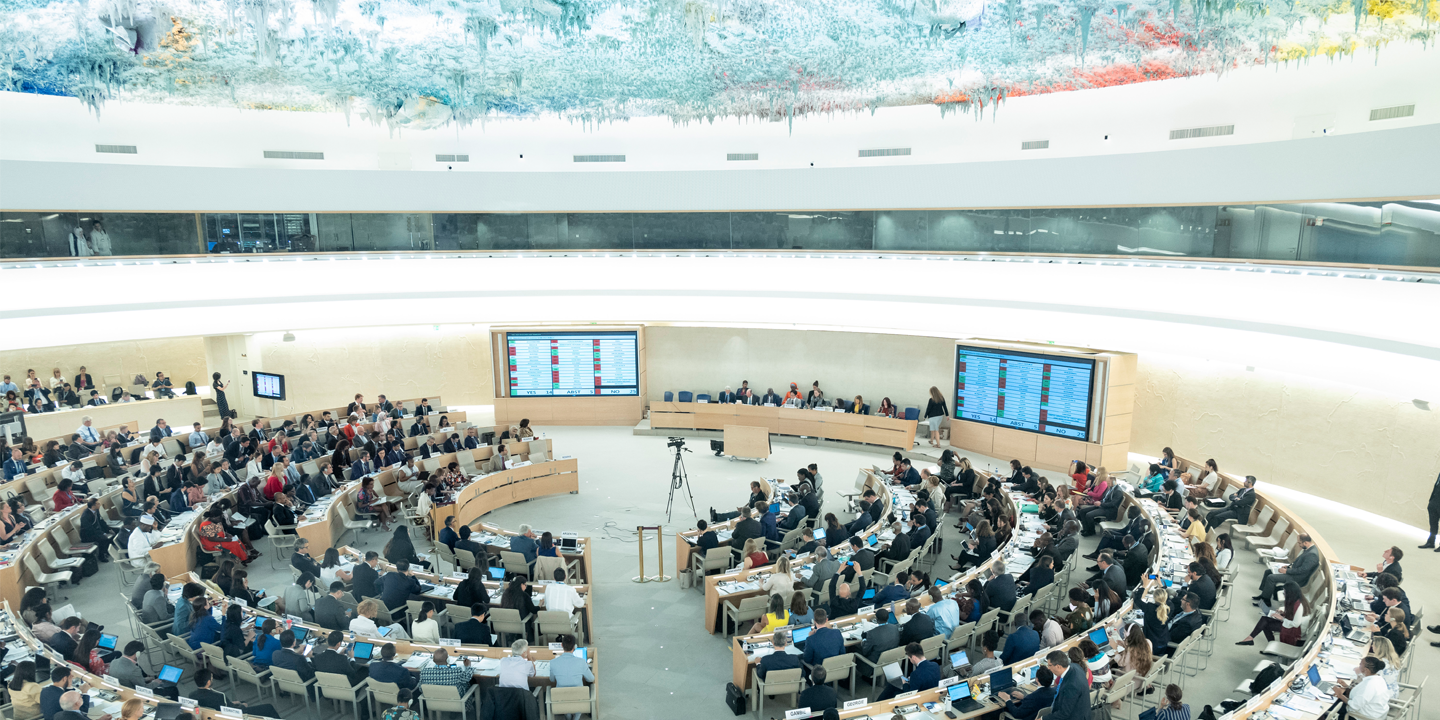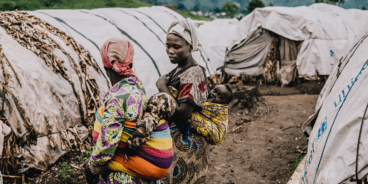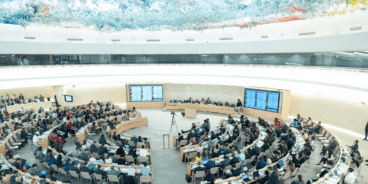

Recommendations for the 46th Session of the Universal Periodic Review
Your Excellency,
In 2005 heads of state and government unanimously agreed on the responsibility of states to protect populations from genocide, war crimes, crimes against humanity and ethnic cleansing. Under the Responsibility to Protect (R2P), it is the primary responsibility of each individual state to protect their own population and the responsibility of the international community to assist them in doing so. The Universal Periodic Review (UPR) of the UN Human Rights Council (HRC) can play an important role in assessing each country’s institutional preparedness to protect human rights and prevent mass atrocities. During the 46th session of the UPR working group, I would therefore like to respectfully encourage you to provide all states that are under review with the following recommendations, where applicable:
-
-
- Expeditiously appoint an R2P Focal Point – a senior government official responsible for the promotion of mass atrocity prevention at the national, regional and international level;
- Sign, ratify and implement the core instruments of International Human Rights Law (IHRL) and International Humanitarian Law (IHL), including the Convention on the Prevention and Punishment of the Crime of Genocide, Additional Protocols I and II to the 1949 Geneva Conventions, Rome Statute of the International Criminal Court (ICC), Convention relating to the Status of Refugees and its 1967 Protocol, Arms Trade Treaty and 1954 Convention for the Protection of Cultural Property in the Event of Armed Conflict;
- In keeping with R2P’s Pillar II, request support from other states, as well as regional and international organizations, when atrocity risks exist that cannot be addressed by your state alone;
- Ensure that all national security forces respect human rights and IHL and fulfill their responsibility to protect all populations within the territory of your state, regardless of race, gender, nationality, ethnicity, religion, sexual orientation or any other status;
- Support accountability for atrocity crimes and all relevant institutions of international justice;
- Issue open invitations to HRC-mandated Special Procedures and fully cooperate with all other HRC mechanisms and procedures;
- Protect human rights defenders and the media, as well as the rights of civil society to operate freely, safely and independently;
- Consult and utilize the Framework for Action for the Responsibility to Protect to assess gaps and identify opportunities to address national atrocity risks.
-
In addition to these general recommendations, we respectfully ask you to consider the tailored recommendations provided below for Afghanistan, Eritrea and Yemen.
Afghanistan
Since the Taliban de facto authorities took control of Afghanistan in 2021, they have perpetuated extreme forms of gender-based discrimination against women and girls through implementation of restrictive policies and practices that deny them their human rights and fundamental freedoms, including freedom of movement, freedom of opinion and expression, employment opportunities, political and public representation and access to education and healthcare. These restrictions are in flagrant violation of their obligations under the Convention on the Elimination of All Forms of Discrimination Against Women (CEDAW). In June 2023 the UN Special Rapporteur on the situation of human rights in Afghanistan and the Working Group on discrimination against women and girls reported that the Taliban de facto authorities’ targeting of women and girls may amount to gender persecution and can be characterized as gender apartheid as the Taliban appear to be governing by systemic discrimination with the intent to subject women and girls to total domination.
The Taliban de facto authorities have also committed widespread and systematic human rights violations throughout the country, including extrajudicial killings, arbitrary arrests and detentions, incommunicado detention and torture and ill-treatment against former government officials and armed forces, media workers and human rights defenders. From 15 August 2021 to 30 May 2023, over 3,774 civilians were killed or wounded mostly in attacks with improvised explosive devices attributed to the so-called Islamic State in Iraq and the Levant-Khorasan (ISIL-K). Attacks by ISIL-K frequently target ethnic and religious minorities, including Hazara Shias, other Shia Muslims, Sufi Muslims, Sikhs and other minorities. The UN Special Rapporteur on the situation of human rights in Afghanistan reported in September 2022 that attacks against ethnic and religious minorities appear to be systematic in nature and reflect elements of an organizational policy, likely amounting to crimes against humanity. Attacks on places of worship have increased since the Taliban forcibly took over Afghanistan.
The Global Centre therefore urges you to include the following recommendations to Afghanistan during the UPR session on 29 April:
-
-
- Fulfill all of Afghanistan’s obligations under CEDAW and end any discriminatory restrictions in law and practice on women’s rights;
- Promptly and thoroughly investigate and prosecute all cases of violence against women and girls, as well as all allegations of torture and other ill-treatment, enforced disappearances and extrajudicial killings;
- Protect all populations in Afghanistan, particularly ethnic and religious minorities;
- Ensure full cooperation with the ICC.
-
Eritrea
According to the report by the HRC-mandated Commission of Inquiry (CoI) on Eritrea from 8 June 2016, the Eritrean government and its ruling party, the People’s Front for Democracy and Justice, have committed crimes of enslavement, imprisonment, enforced disappearance, torture, persecution and murder, which, according to the CoI, amount to crimes against humanity. The CoI also reported that high-level officials authorized sexual violence as a method of punishment in compulsory military service camps – where conscripts are subjected to indefinite periods of national service – and concluded that these crimes amount to sexual slavery and torture. Minority religious groups have also been targeted for systematic persecution. Eritrea has four government-sanctioned religious groups – Eritrean Orthodox, Roman Catholicism, Evangelical Lutheran and Sunni Islam – that are allowed to openly practice their faith while others are forcibly suppressed, including through arrest and imprisonment, and in some cases, adherents have been deprived of citizenship.
Eritrean Defense Forces (EDF) are also responsible for ongoing violations of international law in the neighboring Tigray region of Ethiopia. Despite a November 2022 Cessation of Hostilities Agreement formally ending the two-year conflict in northern Ethiopia, the EDF were not party to the agreement and remain in Tigray, where they continue to perpetrate abuses. During the conflict the UN and international human rights groups documented widespread abuses by the EDF that amount to possible war crimes and crimes against humanity. The EDF, allied with Ethiopia’s federal government, allegedly massacred civilians and perpetrated widespread rape and sexual violence, looting and razing of humanitarian and civilian infrastructure. Eritrean troops have also reportedly participated in the refoulment of Eritrean refugees and the ethnic cleansing of Tigrayans from Western Tigray.
The Global Centre therefore urges you to include the following recommendations to Eritrea during the UPR session on 6 May:
-
-
- Allow full, free and unimpeded access of UN special procedures, including the Special Rapporteurs on the situation of human rights in Eritrea, on torture and other cruel, inhuman or degrading treatment or punishment, on extrajudicial, summary or arbitrary executions and other relevant thematic mandate holders;
- Establish an independent national human rights institution, in accordance with the Paris Principles;
- Guarantee that Eritreans are able to return to Eritrea safely, with dignity and without fear of persecution for having left Eritrea;
- End practices of arbitrary arrests, indefinite detention, torture and ill-treatment of detainees and release political prisoners, including journalists and members of religious groups held on account of their beliefs or affiliations, as well as allow greater transparency in legal proceedings for those arrested;
- Establish a review of the country’s military conduct in Tigray and ensure accountability for crimes committed by Eritrean military personnel.
-
The Global Centre further respectfully encourages you to consider the following advanced questions for the review of Eritrea:
-
-
- What measures are Eritrea undertaking to halt ongoing abuses by its forces in Ethiopia?
- What steps has the government taken, or will take, to establish an independent national human rights mechanism that can address human rights violations and provide redress for victims?
-
Yemen
Since March 2015 all parties to the conflict in Yemen have perpetrated violations and abuses of international law that may amount to war crimes, including indiscriminate airstrikes and shelling, torture, arbitrary detention and sexual and gender-based violence. More than 19,200 civilians have been killed or maimed as a result of airstrikes by the Saudi Arabia and United Arab Emirates (UAE)-led international coalition alone, including over 2,300 children. During October 2021 the HRC terminated the mandate of the Group of Eminent Experts (GEE), the only international independent mechanism dedicated to monitoring international law violations in Yemen. The abrupt termination of the GEE was followed by a dramatic escalation in armed hostilities and indiscriminate bombing inflicting immense civilian harm, with the Saudi/UAE-led coalition carrying out over 200 air raids per month until a six-month truce was agreed to in April 2022. Since the truce expired in October 2022, there has not been a significant escalation in hostilities and no airstrikes have been carried out by the Saudi/UAE-led coalition. However, over 2,140 civilians have been killed or injured since then as occasional clashes continue across several governorates.
The ongoing negotiation process between parties to the conflict does not sufficiently address widespread violations and abuses of international law or accountability for previous atrocities. Additionally, there are no viable paths to address accountability despite continued calls from civil society and affected communities. The termination of the GEE entrenched impunity and emboldened all parties to the conflict to continue to commit possible war crimes and other serious violations. In July 2023 over 60 Yemeni civil society organizations released the Yemen Declaration for Justice and Reconciliation, in which they set forth their common vision for achieving justice and reconciliation in Yemen.
The Global Centre therefore urges you to include the following recommendations to Yemen during the UPR session on 1 May:
-
-
- Ratify the Rome Statute and implement the Statute in national legislation, including by incorporating provisions to cooperate promptly and fully with the ICC;
- Ensure effective, independent investigations of human rights abuses and violations of IHRL and IHL, and prosecute and hold those responsible to account, in accordance with international investigation and fair trial standards;
- End the practices of arbitrary arrest and detention, enforced disappearance and other ill-treatment and release all those arbitrarily detained;
- Ensure that any negotiated settlement or peace process includes participation of victims, effectively addresses their rights to justice and elaborates on the necessary steps to fulfill transitional justice imperatives, including reparative measures.
-
The Global Centre further respectfully encourages you to consider the following advanced question for the review of Yemen:
-
-
- What timeline has the government of Yemen identified for providing sufficient reparations to victims and their families for damages sustained as a result of violations during hostilities?
-

